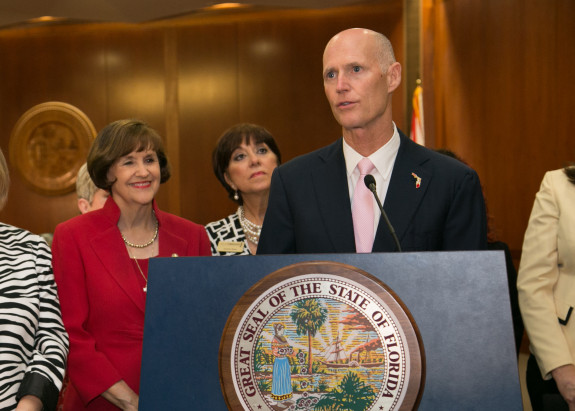
Gov. Rick Scott hires outside counsel to go after a special effects company that received $20 million in state funds and then went bankrupt. (Photo via FLGov.com)
By Ashley Lopez
Florida Center for Investigative Reporting
The state is turning to outside lawyers to sue a company officials gave a $20 million economic incentive to, before it went bankrupt in 2012.
The company laid off about 300 employees in Florida and left the state without a return on that investment. Officials had doled out that money in the hopes of bringing tech jobs to Florida. At the time the bankruptcy was announced, it was estimated local governments would also stand to lose around an additional $110 million because of the botched deal.
Years after the bankruptcy, the state is beefing up its legal team to go after the company.
The Orlando Sentinel reported:
Gov. Rick Scott’s office announced Wednesday he was hiring outside counsel to sue the failed Digital Domain special-effects company and “other parties” involved in a $20 million tax-incentive deal that tanked.
The move comes more than a year after Scott’s inspector general presented an investigative report that found evidence former Gov. Charlie Crist and legislative leaders had bypassed the normal review process for incentives to push through the $20-million economic-development project.
Scott and Crist are now both locked in a heated race for governor, and the statement from Scott general counsel Peter Antonacci lays blame for the deal at the feet of the “previous administration.”
Scott’s inspector general found the Port St. Lucie-based Digital Domain project initiated in 2009 was personally pushed by Crist through leftover incentive dollars that would have otherwise reverted back to general revenues. Instead, they were allocated through a political process known as “proviso language” inserted in the budget.
Three years later, Digital Domain, a special effects company founded by James Cameron that worked on films including “Titanic” filed for bankruptcy and shuttered its offices. The state has since attempted to get in line with other creditors to get its $20 million back.
The state’s record with these economic incentive deals, which have only been somewhat transparent in the past year, has been a mixed bag.
According to The Florida Current this past January, the Florida Office of Economic and Demographic Research wrote in a report that “Florida taxpayers did not get a hefty return on investment for many economic incentive programs over a three-year period, with some programs even costing the state money.” However, some incentives paid off immensely for the state.
There still isn’t a lot of research that shows whether or not the state’s investments, which have varied from tax breaks to incentive checks, have paid off. There is little record showing if the number of jobs projected was actually created in return.
Even after a law aimed at making the economic incentive program more transparent was signed into law, an inspector general report found that the process for doling out millions of taxpayer dollars to private companies had not changed much since the Digital Domain bankruptcy.
The report found the state is in danger of writing a check for millions and getting nothing in return — again.
The Palm Beach Post reported in March 2013:
“We found no apparent violations of law, rule or regulation,” wrote Melinda Miguel, Scott’s chief inspector general.
As Scott lavishes job incentives on private companies, there’s little to stop another flop like Digital Domain, Miguel wrote.
“Although improvements have been made to statutes and processes since 2009, an award similar to the one to Digital Domain could happen again today if the Legislature appropriates funds and gives the executive branch the discretion to expend those funds,” Miguel wrote …
Miguel recommended a few changes to the incentive process used by Enterprise Florida, an Orlando-based non-profit organization, and Florida’s Department of Economic Opportunity, including a process for state officials to follow when Enterprise Florida and the governor’s administration disagree on an incentive project.
Following that report—as The Orlando Sentinel noted—“Scott’s office and lawmakers didn’t revisit the incentive review process last year.” According to the newspaper:
…Scott’s office did not immediately respond to inquiries about why the outside counsel was being hired now.
“The state has hired outside counsel to identify any and all legal action available against the company and any other individuals involved in wrongdoing related to this bad deal,” Antonaccisaid in a statement. “We expect to announce specific legal action in the coming weeks.”
Two years ago, state lawmakers made it easier for Scott to give out economic incentives. The changes also shortened the window for which state officials could evaluate pending deals.
